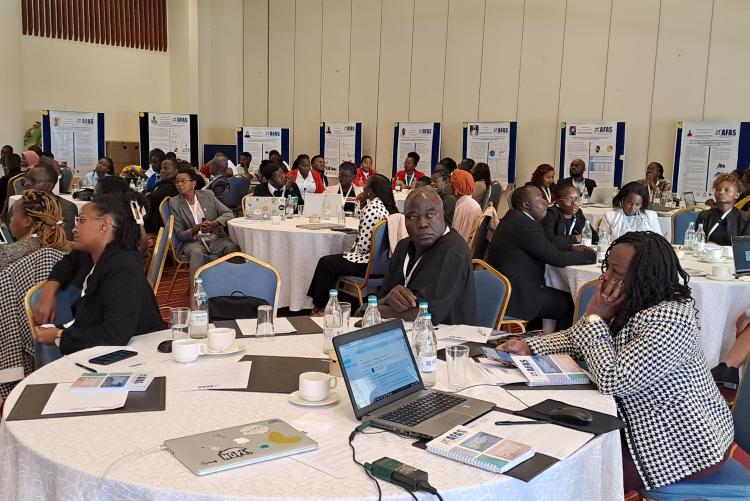Nairobi, Kenya – December 14, 2023 –stakeholders from across East Africa convened for the AFAS Stakeholder Workshop. Under the banner of "Profitable Nature-based Solutions for Climate Change Adaptation and Biodiversity Conservation," the event brought together policymakers, businesses, NGOs, and scientists to forge a united front against pressing environmental challenges.
The workshop's mission was threefold:
- Strengthen the NbS Network: By fostering collaboration between diverse groups, AFAS aims to create a robust ecosystem for knowledge sharing and project implementation.
- Unlock Profitability in NbS: The workshop explored innovative approaches to make NbS financially viable for businesses and NGOs, ensuring their long-term sustainability.
- Bridge the Gap Between Academia and Practice: AFAS students, the future generation of environmental champions, were connected with stakeholders for mentorship, internships, and research opportunities, fostering a mutually beneficial exchange.
Professor Olago, Chair of the Department of Earth Climate Sciences, set the stage with a compelling overview of AFAS's progress and impact. He highlighted the center's unwavering focus on protecting and sustainably managing African savannas, emphasizing the potential of Nature-based Solutions (NbS) to address climate change and biodiversity loss while delivering social, economic, and environmental benefits.
Professor Olago commended the active participation of AFAS students in NbS initiatives, showcasing their dedication to tackling environmental challenges head-on. He emphasized the center's success in equipping graduates for the local and international job markets in climate protection and environmental conservation.
Professor Hutchinson, representing the Vice-Chancellor, shed light on AFAS's origins and purpose as a DAAD Global Centre for Climate and Environment. Founded in 2021, AFAS champions NbS through interdisciplinary and international collaboration, bridging the gap between science, policy, practice, and communities. Professor Hutchinson underscored the critical role of African savannas, covering nearly half the continent and supporting millions of lives. These ecosystems are not only biodiversity hotspots but also vital contributors to tourism income and national economies.
AFAS's commitment to international collaboration was a recurring theme. The center actively bridges the francophone-anglophone divide, collaborating with leading institutions in West and East Africa, Germany, and diverse stakeholder groups. This aligns with the University of Nairobi's focus on Science-Policy-Practice Interfaces (SPPIs), interdisciplinary research, and stakeholder engagement, collectively tackling the complex challenges of population growth, human pressures, and climate change.
Ms. Margaret Kirai, Acting Director of DAAD Africa, acknowledged AFAS's crucial role in addressing environmental issues. She pointed to DAAD's longstanding commitment to supporting education and research in East Africa, emphasizing the importance of science in tackling climate change and biodiversity loss.
Ms. Juliane Kabus, representing the German Embassy, reiterated their dedication to promoting biodiversity and climate change mitigation, aligning with the Sustainable Development Goals (SDGs).
The workshop culminated in a dynamic session where 20 AFAS students, representing both PhD and Master's cohorts, presented their research findings. Their diverse projects showcased the practical applications of AFAS's initiatives, from restoring degraded lands to developing sustainable livelihoods for communities.
The AFAS Stakeholder Workshop concluded on a hopeful note, solidifying the center's position as a leading force in addressing climate change and biodiversity conservation in African savannas. With its robust network, focus on SPPIs, and commitment to digital research and capacity building, AFAS is poised to make lasting contributions to environmental preservation and sustainable development. As the workshop concluded, participants expressed their anticipation for continued collaboration and the transformative potential of Nature-based Solutions to create a brighter future for people and planet alike.
Key takeaways:
- AFAS fosters collaboration between policymakers, businesses, NGOs, and scientists to implement effective NbS in African savannas.
- The workshop explored innovative approaches to make NbS financially viable and ensure long-term sustainability.
- AFAS bridges the gap between academia and practice by connecting students with stakeholders for mentorship and real-world experience.
- The workshop highlighted AFAS's commitment to international collaboration and its alignment with the SDGs.
- AFAS stands as a beacon of hope for the future of African savannas and the communities that depend on them.
- Log in to post comments

